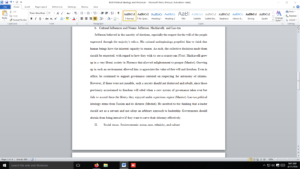Political ideology
Using at least two of these readings as evidence, discuss and analyze how one’s political ideology is a product of the historical/cultural environment in which one lives (personal circumstances, religious views, family climate, national identity, gender/sexual identity, etc. can all apply here as well). In other words, how does our culture, our national identity, and current events influence our opinions on government, its role in the lives of the governed, etc; conversely, another way to think about this assignment is to ask and answer the following question: How can we analyze a system of government to infer its architects’ cultural, social, and/or historical circumstances? Be sure to use concrete examples from your cited sources and analyze those examples to show how they support/prove your thesis.
Requirements:
- MLA style throughout
- 750 words minimum (roughly, don’t bother counting)
- Paragraphs focused around your own ideas
- Textual evidence used to support your own claims
- Close analysis of textual evidence
- Sophisticated interparagraph transitions (transitions that express the relationship between paragraphs, as discussed in class)
Readings (requires at least 2 as evidence):
https://www.latimes.com/
http://www.gutenberg.org/
http://thetaoteching.com (only chapters 1, 2, 3, 44, 48, 76, & 81)
http://www.gutenberg.org/
Attached is an outline and sample thesis.
This is a master level class and hence, quality is paramount.
Answer preview
Jefferson believed in the sanctity of elections, especially the respect for the will of the people expressed through the majority’s edicts. His cultural underpinnings propelled him to think that human beings have the inherent capacity to reason. As such, the collective decisions made them should be respected, with regard to how they wish to see a country ran (Yoo). Machiavelli grew up in a very liberal society in Florence that allowed enlightenment to prosper (Marriot). Growing up in such an environment allowed him to appreciate the value of free will and freedom. Even in office, he continued to support governance centered on respecting the autonomy of citizens. However, if these were not possible, such a society should get destroyed and rebuilt, since those previously accustomed to freedom will rebel when a new system of governance takes over but fails to accord them the liberty they enjoyed under a previous regime (Marriot). Lao-tzu political ideology stems from Taoism and its dictates (Mitchel). He ascribed to the thinking that a leader should act as a servant and not adopt an arbitrary approach to leadership. Governments should abstain from being intrusive if they want to serve their citizenry effectively.
[889 Words]

Political ideology

